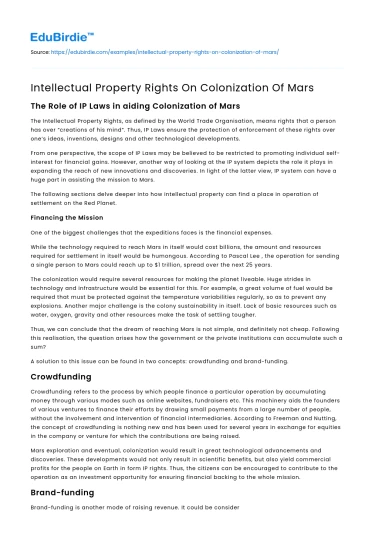The Role of IP Laws in aiding Colonization of Mars
The Intellectual Property Rights, as defined by the World Trade Organisation, means rights that a person has over “creations of his mind”. Thus, IP Laws ensure the protection of enforcement of these rights over one’s ideas, inventions, designs and other technological developments.
From one perspective, the scope of IP Laws may be believed to be restricted to promoting individual self-interest for financial gains. However, another way of looking at the IP system depicts the role it plays in expanding the reach of new innovations and discoveries. In light of the latter view, IP system can have a huge part in assisting the mission to Mars.
The following sections delve deeper into how intellectual property can find a place in operation of settlement on the Red Planet.
Financing the Mission
One of the biggest challenges that the expeditions faces is the financial expenses.
While the technology required to reach Mars in itself would cost billions, the amount and resources required for settlement in itself would be humongous. According to Pascal Lee , the operation for sending a single person to Mars could reach up to $1 trillion, spread over the next 25 years.
The colonization would require several resources for making the planet liveable. Huge strides in technology and infrastructure would be essential for this. For example, a great volume of fuel would be required that must be protected against the temperature variabilities regularly, so as to prevent any explosions. Another major challenge is the colony sustainability in itself. Lack of basic resources such as water, oxygen, gravity and other resources make the task of settling tougher.
Thus, we can conclude that the dream of reaching Mars is not simple, and definitely not cheap. Following this realisation, the question arises how the government or the private institutions can accumulate such a sum?
A solution to this issue can be found in two concepts: crowdfunding and brand-funding.
Crowdfunding
Crowdfunding refers to the process by which people finance a particular operation by accumulating money through various modes such as online websites, fundraisers etc. This machinery aids the founders of various ventures to finance their efforts by drawing small payments from a large number of people, without the involvement and intervention of financial intermediaries. According to Freeman and Nutting, the concept of crowdfunding is nothing new and has been used for several years in exchange for equities in the company or venture for which the contributions are being raised.
Mars exploration and eventual, colonization would result in great technological advancements and discoveries. These developments would not only result in scientific benefits, but also yield commercial profits for the people on Earth in form IP rights. Thus, the citizens can be encouraged to contribute to the operation as an investment opportunity for ensuring financial backing to the whole mission.
Brand-funding
Brand-funding is another mode of raising revenue. It could be considered an indirect method of crowdfunding. This involves owners of certain brands sponsoring a particular venture in return of visibility of their brand on the final produce.
The idea of brand-funding could really help in collection of massive amounts of revenue. The kind of exposure that the mission would help the products gain is incomparable. For example, a product could find place on the spaceship en route to the Red Planet. This level of advertisement is any product and brand owner could ask for.
This mechanism is not only limited to taking off but also to actual settlement on Mars. We must realize that the whole idea of the expedition has been to ensure another planet for human settlement. Thus, Mars is a new territory altogether and must be treated as such for various commercial enterprises and commodities. Licensing agreements on lone usage and shipment of goods and products to Mars would ensure a “planet-wide exclusivity” for the brands and protection of other IP rights and privileges for decades.
The idea of being the first soap/shoes/or any other product to be used on Mars would tempt many huge corporations to back the endeavour. Hence, it is a rational and realistic assumption that product owners would compete to participate in the mission. Brand auctioning can also be used to increase the money raised., where different corporate houses could bid for the top position. This idea is very much in line with patent auctions as well.
Both the mechanisms of crowd and brand-funding, as powerful marketing and publicity tools, would not only bring enormous sums of monies, but also help in ultimately sharing the risk of what is probably the biggest project undertaken in the scientific history of mankind.






 Stuck on your essay?
Stuck on your essay?

